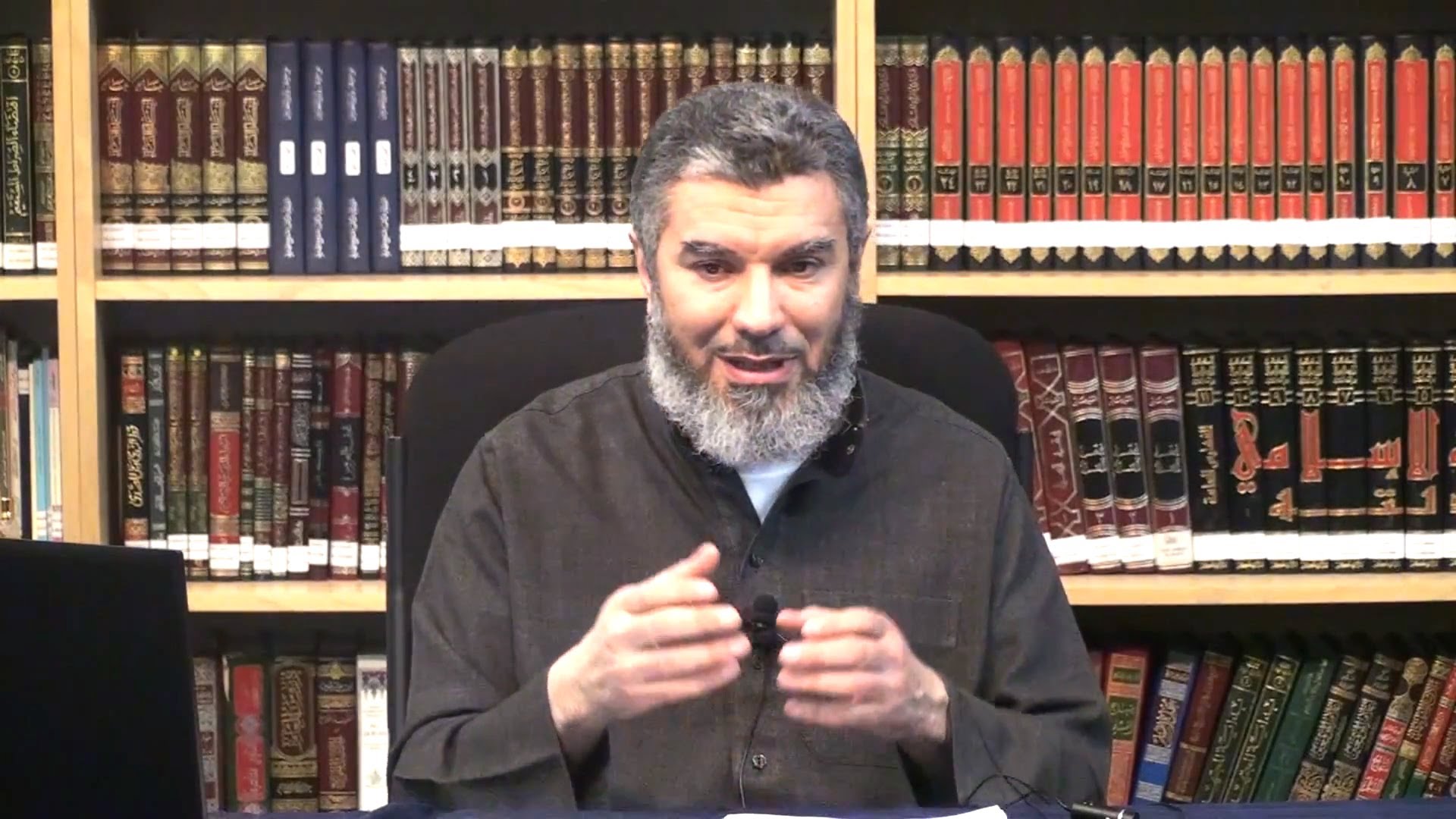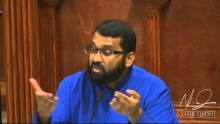Where is Allah? by Mufti Abdur Rahman ibn Yusuf
12 years ago
29:15
3,733 views
Aqeedah: The concept of Ta'weel & Tafweed - Mufti Abdur Rahman ibn Yusuf
"..In the case of the expressions sitting, coming, descending, face, hands, eyes, and the like, the (theologians) abandoned their real linguistic meaning, which would suggest deficiency, anthropomorphically, for metaphoric interpretation. It is the method of the Arabs to resort to metaphoric interpretation whenever the real meanings of words present difficulties. This is done, for instance, in connection with the verse of the Qur'an: "(A wall) that wanted to collapse," and similar cases. It is a well-known method of the Arabs which is not disapproved of and constitutes no innovation. (It is true,) the (metaphoric) interpretation (of the attributes mentioned) is contrary to the opinions of the early Muslims, who left (the matter to God). However, the theologians were led to adopt it by the fact that a number of followers of the early Muslims, namely, the novelty-conscious and more recent Hanbalites, erred with regard to the significance of those attributes. They considered them to be definite attributes of God of which it is not known "how" they are.
With regard to the statement, "He sat upright upon the throne," they say, "We affirm that He sits, as the word indicates, because we fear to negate Him, but we do not say how, because we fear anthropomorphism, which is denied in negative verses such as (these): 'There is nothing like Him'; 'Praised be God, beyond the attributes they give (Him)'; 'God is above what evildoers say'; and 'He did not give birth, and He was not born.'
These people do not realize that it comes under the subject of anthropomorphism for them to affirm the attribute of sitting, because according to the lexicographers, the word "sitting" implies being firmly settled in a place, which is something corporeal. The negation they hate to bring about would (merely) affect the word, and there is nothing dangerous in that. What is to be avoided is the negation of divinity. They also hate to assume the imposition of an obligation that (human beings) are unable to fulfill. This, however, is a delusion, because ambiguous statements have no bearing upon obligations. Then, they claim that (their opinion) is the opinion of the early Muslims, who, in fact, held no such opinion.
Their opinion was the one we established at the beginning, namely, to leave to God (the question of) what is meant by the (attributes), and not to say that one understands them. The (Hanbalites) argue in favor of (God's) sitting, using Malik's statement, "(The fact of God's) sitting is known, but it is not known how (God sits)." Malik did not mean that sitting is known as a definite (attribute) of God. He certainly would not have said such a thing, because he knew the meaning of "sitting." He merely meant that (the meaning of) sitting is known linguistically, and it is something corporeal, but how it takes place - that is, its reality, since the reality of all attributes concerns the how - is not known definitely (in connection) with God.
These people also argue in favor of a "place" (for God). They do so by using the tradition of the black (slave girl). The Prophet asked her: "Where is God?" She answered: "In heaven." Whereupon (the Prophet) said (to her owner): "Set her free, for she is a believer." Now, the Prophet did not assume that she was a believer because she affirmed the existence of a place for God, but because she believed the plain statements in His Revelation which say that God is in heaven. Thus, she became one of those "firmly rooted (in knowledge)," who believe in ambiguous statements without searching for their meaning. It is definite that one has to disavow the existence of a "place" for God. This follows from the logical argument denying (God's) need (for anything), and from the negative evidence that calls for freeing (God' from attributes), as found, for instance, (in the verse), "There is nothing like Him," and similar statements. It also follows from the Qur'anic statement, "He, God, is in the heavens and upon earth." Nothing that exists can be in two places (at the same time). Thus, the verse is not a definite indication that God is located in a certain place, but must mean something else.
These people then extended the interpretation they had invented to the plain meaning of face, eyes, hands, coming, descending, and speech with letter (sound) and voice. They assumed that these words had meanings that were more general than (mere) references to the body. They declared God free from the corporeal meaning of these attributes. However, this is something that is not recognized in the language." (Ibn Khaldun, Muqaddimah)
Video composed by "bychoicemuslim" channel.
You can also like us on facebook: www.facebook.com/zamzamacademy
or Follow us on twitter: http://www.twitter.com/zamzamacademy
Our Youtube channel is: http://www.youtube.com/ZamZamAcademy
"..In the case of the expressions sitting, coming, descending, face, hands, eyes, and the like, the (theologians) abandoned their real linguistic meaning, which would suggest deficiency, anthropomorphically, for metaphoric interpretation. It is the method of the Arabs to resort to metaphoric interpretation whenever the real meanings of words present difficulties. This is done, for instance, in connection with the verse of the Qur'an: "(A wall) that wanted to collapse," and similar cases. It is a well-known method of the Arabs which is not disapproved of and constitutes no innovation. (It is true,) the (metaphoric) interpretation (of the attributes mentioned) is contrary to the opinions of the early Muslims, who left (the matter to God). However, the theologians were led to adopt it by the fact that a number of followers of the early Muslims, namely, the novelty-conscious and more recent Hanbalites, erred with regard to the significance of those attributes. They considered them to be definite attributes of God of which it is not known "how" they are.
With regard to the statement, "He sat upright upon the throne," they say, "We affirm that He sits, as the word indicates, because we fear to negate Him, but we do not say how, because we fear anthropomorphism, which is denied in negative verses such as (these): 'There is nothing like Him'; 'Praised be God, beyond the attributes they give (Him)'; 'God is above what evildoers say'; and 'He did not give birth, and He was not born.'
These people do not realize that it comes under the subject of anthropomorphism for them to affirm the attribute of sitting, because according to the lexicographers, the word "sitting" implies being firmly settled in a place, which is something corporeal. The negation they hate to bring about would (merely) affect the word, and there is nothing dangerous in that. What is to be avoided is the negation of divinity. They also hate to assume the imposition of an obligation that (human beings) are unable to fulfill. This, however, is a delusion, because ambiguous statements have no bearing upon obligations. Then, they claim that (their opinion) is the opinion of the early Muslims, who, in fact, held no such opinion.
Their opinion was the one we established at the beginning, namely, to leave to God (the question of) what is meant by the (attributes), and not to say that one understands them. The (Hanbalites) argue in favor of (God's) sitting, using Malik's statement, "(The fact of God's) sitting is known, but it is not known how (God sits)." Malik did not mean that sitting is known as a definite (attribute) of God. He certainly would not have said such a thing, because he knew the meaning of "sitting." He merely meant that (the meaning of) sitting is known linguistically, and it is something corporeal, but how it takes place - that is, its reality, since the reality of all attributes concerns the how - is not known definitely (in connection) with God.
These people also argue in favor of a "place" (for God). They do so by using the tradition of the black (slave girl). The Prophet asked her: "Where is God?" She answered: "In heaven." Whereupon (the Prophet) said (to her owner): "Set her free, for she is a believer." Now, the Prophet did not assume that she was a believer because she affirmed the existence of a place for God, but because she believed the plain statements in His Revelation which say that God is in heaven. Thus, she became one of those "firmly rooted (in knowledge)," who believe in ambiguous statements without searching for their meaning. It is definite that one has to disavow the existence of a "place" for God. This follows from the logical argument denying (God's) need (for anything), and from the negative evidence that calls for freeing (God' from attributes), as found, for instance, (in the verse), "There is nothing like Him," and similar statements. It also follows from the Qur'anic statement, "He, God, is in the heavens and upon earth." Nothing that exists can be in two places (at the same time). Thus, the verse is not a definite indication that God is located in a certain place, but must mean something else.
These people then extended the interpretation they had invented to the plain meaning of face, eyes, hands, coming, descending, and speech with letter (sound) and voice. They assumed that these words had meanings that were more general than (mere) references to the body. They declared God free from the corporeal meaning of these attributes. However, this is something that is not recognized in the language." (Ibn Khaldun, Muqaddimah)
Video composed by "bychoicemuslim" channel.
You can also like us on facebook: www.facebook.com/zamzamacademy
or Follow us on twitter: http://www.twitter.com/zamzamacademy
Our Youtube channel is: http://www.youtube.com/ZamZamAcademy


 English
English Български
Български No filter
No filter











